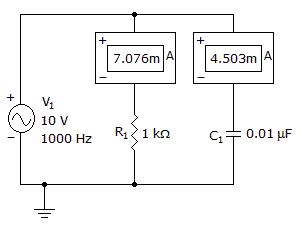Discussion
Home ‣ Electronics ‣ Capacitors Comments
- Question
If a charged capacitor is disconnected from a circuit, it will:
Options- A. immediately discharge
- B. recharge
- C. remain charged
- D. leak the charge
- Correct Answer
- leak the charge
- 1. What is the circuit's impedance?

Options- A. 1192 Ω
- B. 843 Ω
- C. 723 Ω
- D. 511 Ω Discuss
- 2. With a 500 kHz signal source, what would be the value of a capacitor yielding a capacitive reactance of 1 k Ω?
Options- A. 318 pF
- B. 2 nF
- C. 3.18 µF
- D. 2 F Discuss
- 3. A source voltage across a capacitor will:
Options- A. lead the current by 90 degrees
- B. lead the current by 180 degrees
- C. lag the current by 90 degrees
- D. lag the current by 180 degrees Discuss
- 4. A capacitor stores energy within a dielectric between the conducting plates in the form of:
Options- A. a magnetic field
- B. positive voltage
- C. negative voltage
- D. an electric field Discuss
- 5. The voltage read by the voltmeter will be:

Options- A. 24 V
- B. 12 V
- C. 6 V
- D. 4 V Discuss
- 6.

How long would it take the capacitor in the given circuit to completely discharge if the switch was in position 2?
Options- A. 22 ms
- B. 69 ms
- C. 345 ms
- D. 420 ms Discuss
- 7. What is wrong with a leaky capacitor?
Options- A. It is open.
- B. It is shorted.
- C. The dielectric resistance has increased.
- D. The dielectric resistance has decreased. Discuss
- 8. A resistor and an output capacitor form a series circuit with a square wave applied. The circuit is:
Options- A. an integrator
- B. a differentiator
- C. a multiplier
- D. a divider Discuss
- 9. What do variable capacitors use for dielectric?
Options- A. ceramic, electrolytic, mica, or paper
- B. air, ceramic, mica, or plastic
- C. ceramic, paper, plastic, or mica
- D. mica, ceramic, plastic, or electrolytic Discuss
- 10. What is the dc charging/discharging time constant for the circuit?

Options- A. 294 ps
- B. 13.5 ms
- C. 21.25 ms
- D. 2.16 Gs Discuss
Capacitors problems
Search Results
Correct Answer: 1192 Ω
Correct Answer: 318 pF
Correct Answer: lag the current by 90 degrees
Correct Answer: an electric field
Correct Answer: 12 V
Correct Answer: 420 ms
Correct Answer: The dielectric resistance has decreased.
Correct Answer: an integrator
Correct Answer: air, ceramic, mica, or plastic
Correct Answer: 21.25 ms
Comments
There are no comments.More in Electronics:
Programming
Copyright ©CuriousTab. All rights reserved.
